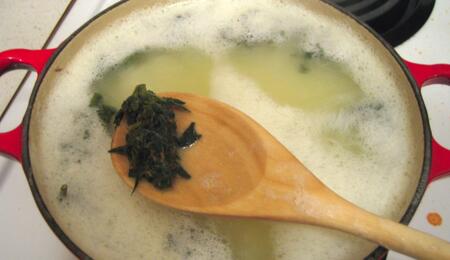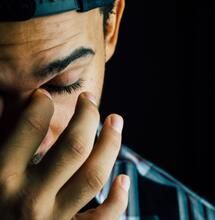Returning to Roots, Thailand Rolls Out Cannabis Food Menus to Customers

Thailand has been long associated with cannabis. But only recently has the country moved to legalize medical marijuana - in 2019, to be exact. And only last month has the kingdom finally delisted cannabis as a narcotic, giving the green light for licensed cannabis providers to use cannabis in cooking.
Thailand is the country of legendary landrace strains such as Thai Stick. It’s the country where Leo DiCaprio and friends ended up on a beautiful paradise island, half of it a cannabis plantation and nod to the country’s thriving black markets, on their way to reach the perfect beach in director Danny Boyle’s adventure drama from 2000, The Beach.
The kingdom is now also the first Southeast Asian country to legalize medical cannabis. Thailand’s medical marijuana clinics were swift to introduce new items on their menus following the legalization. Their unique recipes stir leaves, stems, and roots from cannabis on the dish, fresh and deep-fried. So, at the restaurant at the Chao Phraya Abhaibhubejhr Hospital in Pracin Buri, Thailand’s most renowned cannabis research hospital, visitors can treat themselves with happy meals such as ‘giggling bread’ and ‘joyfully dancing salads.’
“Cannabis leaves, when put in the food or even in a small amount … it will help the patient to recover faster from the illness,” said Pakakrong Kwankao, the hospital’s project leader, according to Reuters’ report. “The cannabis leaf can improve appetite and make people sleep well, and also be in a mood, in a good mood,” doctor Pakakrong said.
A bhang lassi (cannabis-infused drink) shop in Jaisalmer, Rajasthan, India. It's understood cannabis was historically introduced in Thailand from India. Photo credit: Satish Krishnamurthy, CC BY 2.0
The Thai eatery instils cannabis in various ways into the food. It deep-fries the leaf to golden crispness, then putting the leaf onto bread with pork. Or it can be freshly sprinkled into a salad with minced meat and other spices. Marijuana is also served in the eatery’s happy pork soup. There are only trace amounts of THC in these dishes, however.
The restaurant’s policy limits five leaves at the most per customer, but those with low tolerance may opt for a dish with just a half leaf, said Pakakrong. Pregnant women or people with certain health conditions should avoid cannabis-infused items on the menu, she warned. As for other curious-to-try foodies, “recent research found that this small amount can improve mood, focus, and also creativity,” the doctor said.
One diner named Ketsirin Boonsiri described her dish as “quite strange.” “I’ve never taken cannabis before, it feels weird but it’s delicious,” she said. Another diner said the taste of cannabis was similar to other common vegetables, except the after-effects were quite different. “[It] makes my throat dry and I crave sweets,” the customer said.
Will cannabis be the (old) new tourist attraction to Thailand?
The eatery is hoping its cannabis-mixing specialities will attract more foreigners, taking the taboo out of the latterly legalized plant. Thai deputy education minister Kanokwan Vilawan has backed the sentiment, saying the next step was to offer famous Thai dishes to reach an international audience, according to Reuters. “We plan to add more [cannabis] to Thai dishes that are already well known, such as green curry soap, to boost the popularity of these dishes even more,” the minister said.
American tourists treating themselves with cannabis in Chiang Mai, Thailand (1973), Photo credit: Catatonique - Own work, CC BY-SA 3.0
Nevertheless, this latest novelty in Thai cuisine is merely marking Thailand’s return to its culinary past. “Putting cannabis leaves in the food is our culture,” Pakakrong told AFP. “In the past before cannabis was banned … we put small amounts as seasoning herbs and we also use it as a herbal remedy,” she said. Arsala Chaocharoen, a 32-year-old pharmacist, compared her dining experience at the cannabis-serving eatery to eating in the same way ancient Thais did. “They’ve put the cannabis leaves in my noodle soup and this is actually an old traditional knowledge of Thais,” the pharmacist said.
Is recreational cannabis legal in Thailand?
Recreational cannabis remains illegal under Thai law, however, the country is well known for its grand black markets. Cannabis was legal in Thailand up until the 1930s, and its use was widely spread in Thai medicine. Women in labour used the plant to help with the pains, and labourers used it against muscle spasms.
But in the years between the two world wars, the world’s stance on cannabis changed largely on the opposing side. Thailand, like many other countries, succumbed to international pressure and for the first time, introduced laws that prohibited the use of the therapeutic substance. Under the Cannabis Act B.E. 2477 from 1935, Thailand ruled cannabis possession, sale, and use to be made illegal.
It has taken 85 years for cannabis to be made legal again in Thailand, but for now, it’s only available as such for medicinal purposes. The change followed after the Thailand Narcotics Act was amended in 2019 to allow the use of cannabis for medical and research purposes. Emerging as the first country in the region to introduce medical cannabis legislation,
Thailand now poses a key player in Asia. In a rush to benefit from the burgeoning market, neighbouring Asian countries should be fast to follow, making cannabis, at least in some form, legal in their countries too. Historical accounts suggest cannabis was introduced to Thailand from India. The two countries even have the same name for the plant - ganja.
In Southeast Asia, cannabis has been historically used as a fibre, medicine, and food flavour source. Archaeological evidence traces the use of the plant to thousands of years ago.



